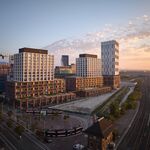Then what is it? Do you disagree that the government should be enforcing this? Do you disagree that for the government to fix suburbanization, they'd in some way have to tell people how to live?
Pollution and suburbanization are deeply engrained societal practices that were slowly legitimized over a period of time when we didn't understand what kind of effects either of these processes would engender. With respect to suburbia, the government has slightly more control than pollution, but even there you might find that it does not have much power. That is not to say that any individual group has any real power: building developers, people who buy houses, people involved in suburbia-related industries (like lawn care or fixing cars), the list goes on. All are at the mercy of each other and no one group is in an especially good position to radically change society for the rest of us.
There will always be some pollution and people who choose to live in a sprawl environment; the important thing is for the people who can make some decisions (not necessarily government) to offer enough of a lifestyle choice in each city; the government could even try some restrictive measures on consumption (taxes) on goods and services that run counter to what it feels is the public good. Even so, you will find that there will still be people who will drive everywhere and consume wantonly.
But your assumption that these things won't happen is wholly without evidence or merit as well.
Well I think it's pretty safe to say that there is a lot less risk involved in maintaining current growth rates (because we know that society has not collapsed yet) than in a society where growth rates are elevated to a level that we have never experienced before. To use scarberian's example, Canada did grow at rates you propose in the early 1900s, but that was because the country was a totally different society where most immigrants were farmers who were transported to the frontiers of Saskatchewan and set loose on the unpopulated prairie. They certainly were not integrating by the millions into existing cities, nor did the government have to set up a physical and social infrastructure to support them. Hell, we didn't have an income tax back then.
2/3. So do you disagree that we need to change our ways of living and that over the past 90 years or so we've lived more and more bleached lives? That's my big question here. Do you think that society nowadays is functioning the way that it should?
There's this romantic notion that contemporary society is always a fall from grace from an earlier, enlightened time into a world of cheap commoditization and plastic meaninglessness. 90 years ago, most people were semi-literate agricultural workers whose only access to culture might have been a country dance at a church social.
4. As you said, it'd be a massive social upheaval to take in all these new immigrants. If a government and people were committed to changing society, that drastic change which larger scale immigration offers would make it a lot easier to break preexisting traditions and structures.
5. I'm basing my allegations on what you're saying. You're telling me that you don't find current society very lacking or much that could be improved on it. You're acting as though you're afraid of change to this society that, in at least the very unphilisophical problems that are very hard to ignore or argue, is facing huge problems when it comes to a fair global economy and environmental protection. You're saying that social upheaval is bad, but you're not saying why the results of the change are bad.
You have no idea what will happen when you break preexisting traditions and structures. Upheaval is not bad, but it is completely uncertain and unpredictable...and more often than not, unmanageable.
6. I was talking about the principle that society shouldn't fix it's problems because it'll mess with your personal mojo. I think that a majority would call that selfish.
You're not fixing any problems, you're jumping into the unknown.
7. Then explain to me what it means, and what my perception of it is flawed.
Sustainability is a pragmatic problem-solving tool that is applied to deal with complex, systemic problems that:
1. are societal, economic and environmental in scope.
2. are complicated by conflicting, subjective values about what the problem is
3. have long-term dynamics (they affect current generations as well as future generations)
Unlike a traditional discipline, like mechanical engineering or English, sustainability doesn't have any set guidelines for practice (there isn't one specific way to solve a sustainability problem that you then apply again and again). It does, however, outline key principles or aspects to consider: in a systemic problem (something that involves multiple actors and actions that contribute to issues arising), you should avoid risky manoeuvers that is beyond comprehension; since problems are often generated by diverse groups of people operating without any awareness of their actions but based on very personal needs and long-established rules and codes, we have to make sure that a sustainable problem-solving strategy is a jointly negotiated process between (ideally) all stakeholders involved in the problem. As such, sustainability advocates for small-scale transitions (little regions, neighbourhoods, farming communities) where it is easy to get a grasp of the problem and the people involved. It also stresses the need for participatory democracy and shared ownership of both the problem and the solution.
Here is why your development strategy is not sustainable:
1. You are advocating some kind of top-down Stalinist social engineering agenda. If it were sustainable, it would be a jointly negotiated process between people who actually live in the rural communities of Canada that you are planning on disrupting to house millions of new immigrants
2. You are ready to act without considering the consequences of your actions. Sustainability demands that action be small and measured, incrementally proceeding toward a goal.
3. You are ready to act without considering the complexity of the system. This is very neatly tied into the concept of risk avoidance and is sort of a follow-up to the point above.
4. You are not accounting for the values of your stakeholders. Human beings are just numbers to be moved around like the zeros on an accountant's ledger. This follows point 1 and is a classic example of why top-down modernist planning schemes (the old Regent Park, collective farming in the Soviet Union, forced migration of urbanites to the Cambodian countryside under Pol Pot) were such catastrophic failures.




